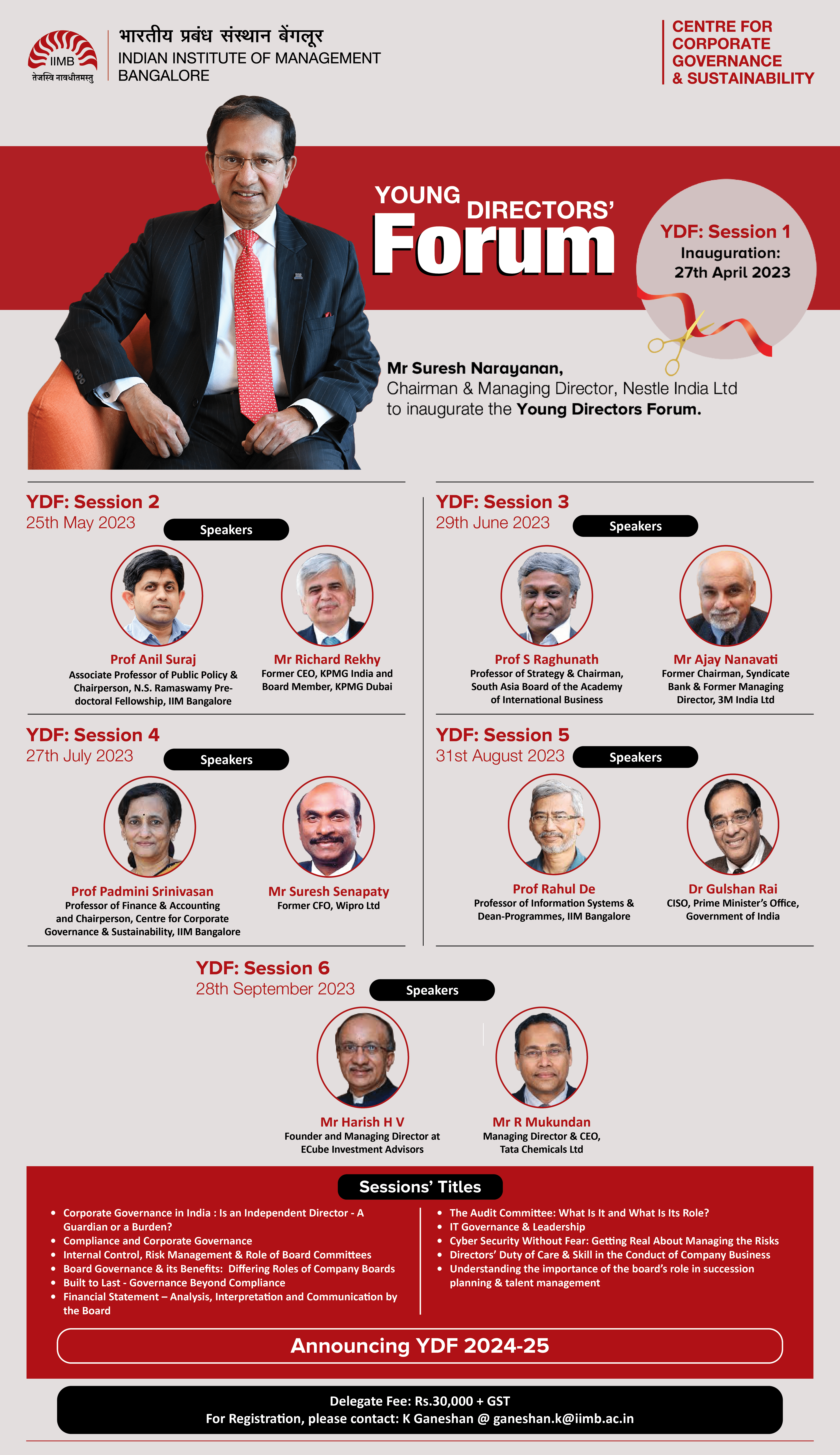Centre for Corporate Governance & Sustainability launched the Young Directors’ Forum on 27th April
Nestle Chairman & MD Suresh Narayanan delivered keynote address on: ‘Corporate Governance in India: Is an Independent Director, a Guardian or a Burden?’
8 May, 2023, Bengaluru: The Centre for Corporate Governance and Sustainability (CCGS) at IIM Bangalore hosted the inaugural session of the Young Directors’ Forum (YDF), a unique initiative that CCGS has launched for young and aspiring Directors to serve on the Boards of companies, on 27th April 2023 (Thursday). The session was held virtually.
The YDF aims to be a unique learning and engagement platform to enhance Board effectiveness, facilitated through a highly focused learning programme. It is an assemblage of Directors and senior executives, who are young and aspiring Directors, to serve on the Boards of companies. ‘Young’ in the ‘Young Directors’ Forum’ is not restricted to age alone but also includes all Board members and senior management executives from private, public and family-managed businesses as well as Independent Directors. This could cut across SMEs, listed companies, unlisted private companies and start-ups, who are being brought together for capability development and mentorship. A group of 31 participants, in the next eleven months, will go through a series of sessions focusing on Corporate Governance practices, policies and culture.
Suresh Narayanan, Chairman & Managing Director, Nestle India Ltd., inaugurated the Young Directors’ Forum and delivered an address on: ‘Corporate Governance in India: Is an Independent Director, a Guardian or a Burden?’
During his keynote address, Suresh Narayanan pointed out that the term governance starts when there is an issue with character. “There is a crisis of character that we have today across the world. It is pervasive in society, pervasive in political life and it is pervasive also in organizations.” Speaking about the issues and challenges faced by society today, in terms of scarcity, he quoted Mahatma Gandhi, saying: “There is enough for every man's need, but not for every man's greed”.
He went on to share his own learnings, experiences and perspectives on the role of Independent Directors, and some of the essential qualities of being an Independent Director. He termed it ‘10 Cs of Good Governance – Character, Competence, Courage, Curiosity, Challenge, Convergence, Compassion, Continuity, Collaboration and Commitment in Crisis', that cover the profile, capabilities, diligence, expectations and culture of an ideal Board. “Putting all these together in practice with seriousness as well as application of thought and action, an organization will be able to create the right culture for the Board, which is like fertilizer to grow a plant. Bad leadership in good organizations always leads to bad results and therefore, the people who are sitting at the helm, the Board of Directors, as leaders, become much more responsible and important to drive the organization through good governance practices.”
The YDF is chaired by Prof. Padmini Srinivasan, Chairperson, Centre for Corporate Governance and Sustainability and faculty from the Finance & Accounting area of IIM Bangalore. Currently, she is also Chairperson of Executive Education Programmes at IIMB. During the inaugural session, she delivered an address on: ‘Imperatives & Challenges of Corporate Governance in India’. She gave an overview of Corporate Governance in India and pointed out that the importance of Corporate Governance gained momentum after the failure of some of the larger corporations around the world, including those in India. “In the last ten to fifteen years, Corporate Governance regulations have increased tremendously. Internal Control and Risk Management; disclosures and transparency; strategy of business; technology; diversity; social and sustainable issues; succession planning and selection of the Board of Directors, particularly the role of Independent Directors, are the important drivers of Good Governance practices that will judge an organization’s long-term success.”
Prof. Chetan Subramanian, the then Dean, Faculty and faculty of the Economics area of IIMB, also addressed the audience. He spoke about the importance and the changing landscape of Corporate Governance in today’s context – from a shareholder-centric or agency theory-based model to a richer framework encompassing sustainability and society. “Today, companies/organizations are expected to play a much larger role in terms of care for society and the environment, and not just merely to maximize their shareholders’ interests. Going forward, societal engagement and corporate citizenship will be among the key points of the agenda that Boards will need to actively engage in. Climate change, disruption in the supply chain, disaster management and business continuity are some of the critical aspects that Boards have to focus on”. He concluded his address by saying, “This century belongs to India and India will become the engine of the global economy. Therefore, Corporate Governance plays a key role in ensuring that the benefits of growth are both equitable and sustainable”.
Ajay Nanavati, Member of the Board of Advisors, IIM Bangalore-Centre for Corporate Governance & Sustainability, also addressed the participants. Greeta Verghese, Chief Operating Officer, Centre for Corporate Governance & Sustainability, delivered the welcome address.
The sessions of the forum will see collaborative learning, individual feedback and discussions on first-hand experiences of guest speakers, who have served in Board leadership roles in a range of organizations. These sessions will include discussions on Corporate Governance and Environmental, Social & Governance (ESG) policies and practices by Indian companies as well as global organizations. The speakers at the forum will include experts from industry as well as faculty from IIMB.

